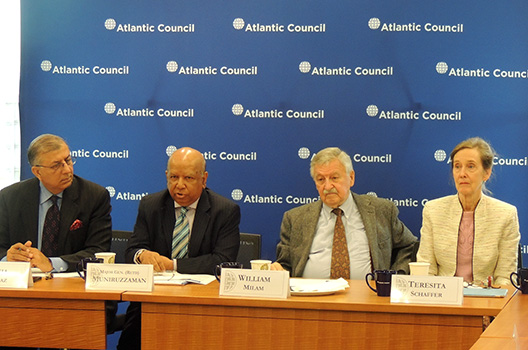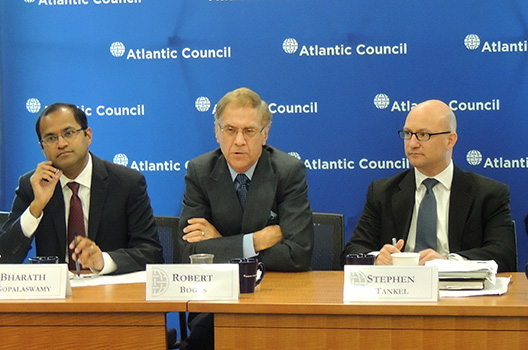 On October 1, the Atlantic Council’s South Asia Center hosted a two-panel discussion on Bangladesh. Panelists Amb. William Milam, Senior Scholar, Asia Program, Wilson Center; Amb. Teresita Schaffer, Nonresident Senior Fellow, Foreign Policy, The India Project, Brookings Institution; and Maj. Gen. (Retd.) Muniruzzaman, President, Bangladesh Institute of Peace and Security Studies discussed the new political order in the country following elections in early 2013, and implications to economic progress. The second panel focused on Bangladesh’s role in building regional security with comments from Dr. Robert Boggs, Professor, Near East and South Asia Center; Mr. Shafqat Munir, Associate Research Fellow, Bangladesh Institute of Peace and Security Studies; and Dr. Stephen Tankel, Assistant Professor, American University.
On October 1, the Atlantic Council’s South Asia Center hosted a two-panel discussion on Bangladesh. Panelists Amb. William Milam, Senior Scholar, Asia Program, Wilson Center; Amb. Teresita Schaffer, Nonresident Senior Fellow, Foreign Policy, The India Project, Brookings Institution; and Maj. Gen. (Retd.) Muniruzzaman, President, Bangladesh Institute of Peace and Security Studies discussed the new political order in the country following elections in early 2013, and implications to economic progress. The second panel focused on Bangladesh’s role in building regional security with comments from Dr. Robert Boggs, Professor, Near East and South Asia Center; Mr. Shafqat Munir, Associate Research Fellow, Bangladesh Institute of Peace and Security Studies; and Dr. Stephen Tankel, Assistant Professor, American University.
{soundcloud}https://soundcloud.com/atlanticcouncil/bangladesh-in-focus{/soundcloud}
Following an election in early 2013, in which the current ruling party ran uncontested, the Awami League has established a strong, centralized state adopting authoritarian approaches to national security and state-building. According to Boggs, the primary goal of Bangladesh is to have a moderate democracy, secularism and rule of law – “basically, getting its own house in order.”

“Bangladesh is among the many countries which is still developing their state,” added Milam. A democracy requires a protected civil society and sound economic and financial systems that facilitate free market trade and commerce. Bangladesh has witnessed a reduction to 5.5% growth, down from 7% just three years ago. The country is heavily dependent on foreign direct investment (FDI), and has been witnessing a substantial decline in that sector as well. Therefore, policymakers are now pushing for increased domestic investment and a diversification of the economy, beyond the agrarian or ready-made garments sector.
Regarding the security situation, Muniruzzaman said, “Bangladesh has had its fair share of small, medium, and large terrorist groups operating in the country… many of these organizations are trying to resurface….the other political forces are not being allowed to operate.” Tankel warned that the cultivation and export of terrorism is possible in Bangladesh, stating the country must address its policy on terrorism seriously. Munir briefly discussed ISIL, which is fast becoming a major concern for policymakers in Bangladesh, particularly with their use of social media. Extremist messages through the internet and social media can now reach up to 80% of 80 million people in the country. The extremist groups are using social media to minimize US-Bangladesh relations, radicalize the youth, and recruit and mobilize new supporters—and this must be contained quickly. Reiterating the need to develop their state, Munir argued that a lack of competent national security infrastructure and organizational hierarchy will threaten the region and country if left unaddressed. All panelists agreed, the political reconciliation will help the country progress in the direction of a consolidated rule of law and democratic structures.
